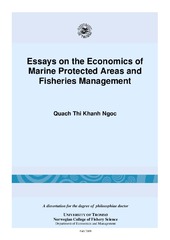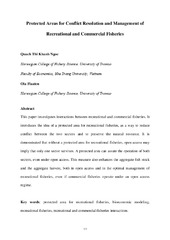| dc.contributor.advisor | Flåten, Ola | |
| dc.contributor.author | Quach, Thi Khanh Ngoc | |
| dc.date.accessioned | 2010-07-23T15:49:07Z | |
| dc.date.available | 2010-07-23T15:49:07Z | |
| dc.date.issued | 2009-11-20 | |
| dc.description.abstract | Even though the oceans occupy more than 70% of the earth’s surface and 95% of the biosphere (National Research Council, 2001), marine habitats have undergone a substantial decline over the last few decades, and most of which is attributable to fishing. In this regard, marine reserves or marine protected areas (MPAs) are proposed as tools to relieve stresses on marine resources and ecosystems. Despite the advantages of MPAs compared to traditional management tools, some concerns have been expressed about the effectiveness of the creation of MPAs when there are links between MPAs and outside areas as a result of the dispersal process. If the open access regime is applied outside the MPAs, it can attract more fishermen to exploit benefits resulting from the migration process and this can reduce the effectiveness of the MPAs. The problem, thus, to be analysed in this dissertation is how MPAs can benefit for fisheries management, and the conditions under which they are beneficial. With the analyses in different contexts, this dissertation investigates following research questions how the efficiency of fishing vessels in an open access fisheries affected by the creation of a marine protected area, how managers can use compensation payment as a tool to get the support from fishermen for biodiversity conservation and is it possible to use protected areas for conflicts resolving and management of recreational and commercial fisheries. Dynamic bioeconomic model, stochastic frontier analysis and principal agent theory are applied in this dissertation as innovative approaches for studying MPAs. The implication from this dissertation is that MPAs are not a cure-all for fisheries management; however, MPAs may be valuable tools for biodiversity conservation and fisheries management if we apply them under appropriate conditions. | en |
| dc.description.doctoraltype | ph.d. | en |
| dc.description | Papers number 1 and 2 of the thesis are not available in Munin due to publishers' restrictions:
<br>1. Quach Thi Khanh Ngoc, Ola Flaaten and Nguyen Thi Kim Anh: «Efficiency of Fishing Vessels Affected by a Marine Protected Area – The Case of Small-Scale Trawlers and The Marine Protected Area in Nha Trang Bay, Vietnam», chapter 15 in Moksness, Dahl and Støttrup (eds.): «Integrated Coastal Zone Management», Wiley-Blackwell, 2009. <a href=http://uniport-prod-sfx.uio.no/sfx_ubto?url_ver=Z39.88-2004&ISBN=978-1-4051-3950-2>Check availablility</a>
<br>2. Quach Thi Khanh Ngoc: «Creation of Marine Reserves and Incentives for Biodiversity Conservation» Natural Resource Modeling, Volume 23, Number 2, May 2010 (Wiley). Available at <a href=http://dx.doi.org/10.1111/j.1939-7445.2009.00060.x>http://dx.doi.org/10.1111/j.1939-7445.2009.00060.x</a> | en |
| dc.format.extent | 330379 bytes | |
| dc.format.mimetype | application/pdf | |
| dc.identifier.isbn | 978-82-91086-81-1 | |
| dc.identifier.uri | https://hdl.handle.net/10037/2600 | |
| dc.identifier.urn | URN:NBN:no-uit_munin_2346 | |
| dc.language.iso | eng | en |
| dc.publisher | Universitetet i Tromsø | en |
| dc.publisher | University of Tromsø | en |
| dc.rights.accessRights | openAccess | |
| dc.rights.holder | Copyright 2009 The Author(s) | |
| dc.subject | VDP::Samfunnsvitenskap: 200::Økonomi: 210::Samfunnsøkonomi: 212 | en |
| dc.subject | VDP::Social science: 200::Economics: 210::Economics: 212 | en |
| dc.subject | Bioeconomic modelling | en |
| dc.subject | incentive payment | en |
| dc.subject | marine protected areas (MPAs) | en |
| dc.subject | recreational and commercial fisheries | en |
| dc.subject | principal-agent theory | en |
| dc.title | Essays on the economics of marine protected areas and fisheries management | en |
| dc.type | Doctoral thesis | en |
| dc.type | Doktorgradsavhandling | en |


 English
English norsk
norsk
